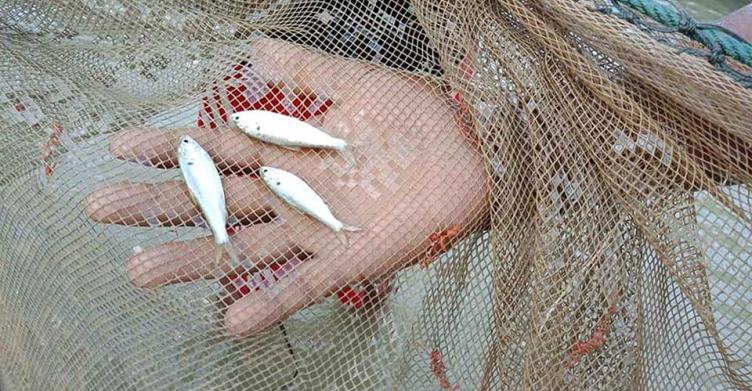
A major problem for the local fishers in the Gulf of Mottama has been illegal fishing with long, fine-mesh stake nets. These nets have been identified as a cause of local fisheries stocks declining, as they indiscriminately catch juvenile fishes. However, previously there were not enough coordination or resources to combat this illegal fishing – thought to be run by businessmen in the town of Kyaikhto.
Through the efforts of local fishers, government departments, and the GoMP, patrolling and enforcement efforts are now more coordinated and effective. These efforts are linked to more broad work to strengthen fisheries management in the Gulf of Mottama.
The Gulf of Mottama Project (GoMP) has been facilitating the review and revision of the current local fishery laws of Mon state and Bago region, working with State and Regional Governments, Department of Fisheries (DoF), General Administration Department (GAD), and Fishery Development Associations (FDAs) made up of representatives from local fishers. Under the new fisheries law, the local fishermen have the right to organize and manage co-management zones, including patrolling for illegal fishing. However, for patrols to have enforcement power, government departments must also be involved.
The FDAs in the project area were officially registered in 2018 after the new amended state and regional fisheries laws were approved. The FDAs are now officially recognized by the state government. With GoMP assistance, the FDAs prepared action plans, included patrolling against illegal fishing. At first, these plans were not approved upon submission to the DoF due to lack of familiarity with the new fisheries law and the lack of available resources from the DoF to cover patrol costs (between 300 to 800 USD for each trip).
Fortunately, the leaders of the FDA didn’t give up! They were able to collect some funding within their own groups and requested the GoMP for additional support and collaboration for joint patrolling. The GoMP team facilitated a joint meeting and a capacity building training on the SMART patrolling technique in the GoM area. After this, the FDAs together with the DoF started developed a patrolling plan with all relevant departments involved and a budget estimate. This paved the way for successful collaboration.
During the first joint trip in Mon State, the patrolling team observed illegal fishing nets along the mudflats in Bilin area. They informed the fishers operating these nets that this kind of fishing was illegal and detrimental for the fish stock for the all the fishermen in the GoM area. In response, some illegal fishing activity moved instead to Bago Region.
To deal with this, the FDAs and DoF decided to prepare a joint patrol between Mon State and Bago Region. This patrol was organized at the beginning of the fishing season, and involved active participation from over 30 local fishermen, four DoF officers, four GAD officers and six police officers. This time, the patrol team found over six kilometers of the illegal fishing nets along the mudflat areas, with two boats used for this illegal fishing. Government officials from both Bago and Mon decided to destroy all the nets to prevent further fishing with these nets in the GoM area, and to demonstrate a commitment to enforcement. The total value of the fishing nets was more than US$ 50,000.
The state and regional government ministers and DoF director made a media interview and gave official news to public that they will organize more similar actions if other illegal fishing is found along the GoM coast. The local and government official media published this news in both newspaper, journal, TV channels and other social media.
Because of this surprise joint patrolling action, most illegal fishing businesses now don’t dare to use these illegal nets in the GoM area, because they know if they are caught the nets will be burned and the loss is too high for them. Continued patrols will be needed to maintain effective enforcement; these are planned.
The major success of this joint activity is a better understanding and trust between local fisher families and government department officials. Therefore, the local fishers are willing to work with government officials and the department officials are more likely to work directly with the fishing communities on other issues as well.
The economic benefit is that, with reduced pressure from these illegal nets, the fish stock and income of fishers in the GoM area might be able to recover.
By: Than Htike Aung, HELVETAS Myanmar
References:
https://www.facebook.com/CLCMGoMP/videos/252304035480162/ the interview with business owner , local fishermen and department of fishery